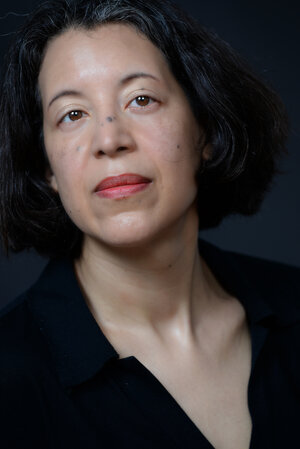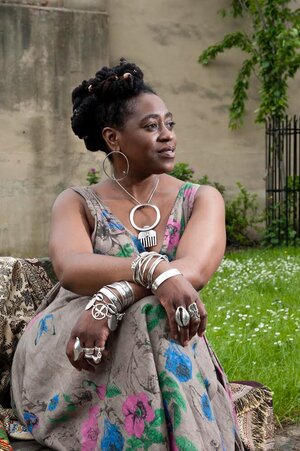The Covid-19 lockdown has meant the cancellation of Carnival, but here’s a new way to experience this most exuberant of outdoor parties. Made in 1986, the BBC’s Calypso, Carnival and Steel Pan and Three Kings of Calypso were part of a special series of Arena films entitled Caribbean Nights. Celebrating all things Caribbean just a few short years after riots had highlighted the country’s racial tensions, the programmes informed the UK about the rich cultural life of its citizens of West Indian heritage, connecting people through music and dance, traditions and stories. Host Darcus Howe chairs a lively discussion with Mexican novelist Carlos Fuentes, publisher and activist John La Rose and Trinidad’s 1986 Calypso King David Rudder, with performances from The Mighty Bomber, Arrow, The Renegades and David Rudder himself. Alongside this, Three Kings of Calypso celebrates top music pioneers Sparrow, Kitch and Roaring Lion.
Ilkley Lit Fest in collaboration with Your Local Arena screened these ground-breaking documentaries. You can stilll watch here the accompanying new short film, with academic Emily Zobel Marshall, literature producer Melanie Abrahams, sociologist Max Farrar and author Anthony Joseph responding to these Arena archives and talking about the resonances they have in an era of Black Lives Matter. You can also still enjoy exclusive new poems inspired by the film from local poets Khadijah Ibrahiim and Michelle Scally Clarke and learn how to start your own personal writing journey with a masterclass from noted non-fiction author Colin Grant, whose West Yorkshire Playhouse-commissioned play Queen of Chapeltown told the history of Leeds, the oldest UK Carnival.
CARIBBEAN NIGHTS: Calypso, Carnival and Steel Pan, and Three Kings of Calypso
Roaring Lion, Lord Kitchener, The Mighty Sparrow — names to bring a smile to your face and songs to make you think.
In 1988, Arena brought these three legends together as part of a four-hour transmission on BBC Two from the three great carnivals of the Western hemisphere: Rio, the Mardi Gras in New Orleans and Trinidad.
Carnival is a Catholic tradition. The word ‘carnival’ is derived from the Latin Carne Vale, literally farewell to flesh, a last grand party the day before Ash Wednesday, which heralds Lent and the abstinence ordained for forty days up to Easter. Pre-Lenten revelry in Britain is confined to the tossing and consuming of pancakes. This celebration deficit is an unfortunate penalty of the success of the Reformation. For several decades now, of course, the Notting Hill Carnival has made up for things here and has brought the Caribbean Carnival spirit to London in the height of summer. However, in nations with a Catholic heritage, Carnival is the star on Shrove Tuesday (as it’s known in the UK) in the spring, from Venice in Italy to the snows of Bavaria in Germany — but the biggest by far are the big three in the so-called New World. Their origin is shared, but each has its own unique character, traditions and music.
Trinidad and calypso are synonymous. Lion, Kitchener and Sparrow were invited to take part, representing succeeding eras of calypso and, by definition, succeeding eras of Carnival. Their meeting was one of the highlights of the programme, shot with elegant simplicity by director Julian Henriques. These three calypso kings are effortlessly cool; they could be candidates on a list of the world’s best dressed men. They swap memories and verses and ruminate on the role of the calypso singer in society. This is a gathering of equals who have nothing to prove. There’s no interviewer, no one is selling anything to anyone.
The newsreel of Kitchener singing ‘London is the place for me’ as he came off the SS Windrush in 1948 has become iconic following the Windrush scandal. Kitch had never seen it; we were able to show it to him for the first time. Along with surprise and nostalgia, more painful memories returned — of the gulf between the optimism of the song and the grim reception those first Caribbean arrivals received here in the UK. As the fame of the newsreel continues to spread, the song becomes an even more telling calypso, incorporating that irony to become increasingly poignant.
In 1986, two years before our celebration of Carnival, Arena presented Caribbean Nights – a Saturday evening, again on BBC Two, devoted to Caribbean art and history, with further films and programmes over the following week. The evening was anchored by the late activist Darcus Howe. One of its main items was a panel discussion devoted to calypso with David Rudder, the then current Calypso King; John La Rose, the London-based Caribbean historian, and Carlos Fuentes, the great Mexican writer. Fuentes represented the Latin Caribbean, with its own islands and a 2,000-mile coastline alongside the English-speaking islands and territories.
The question was: What is Calypso? It began in the days before Trinidad had its own government, radio and newspapers. In their songs, the calypsonians carried the news and their own take on it. They were the media. The year we made the programme, Rudder won the Calypso King title with a smooth, modern presentation supported by promo videos but, however much the style might change to suit the times, calypso remains a commentary on current events.
Calypso is the literary aspect of Carnival, by turns, satirical, sombre, comic and tragic, but always witty and sharp. Rudder’s two successful songs were ‘Bahia Girl’ in which he identifies the two traditions of Brazil and Trinidad as one, and ‘The Hammer’, which marked the passing of the great steel pan maker, Rudolph Charles.
As Howe says, the steel pan is the third element of the trinity: Calypso, Carnival and Steel Pan. There’s nothing quite like the power of a steel pan orchestra in full flight. The Renegades were on hand to prove the point.
The calypsonians practice a kind of verbal alchemy, turning events, emotions and ideas into sung poetry. The steel pan maker practices literal alchemy, transforming the base metal of a disused oil drum into an exquisite musical instrument. The great traditions of the trinity remain testimony to Trinidad’s ingenuity, imagination and artistry.
Anthony Wall
6 September 2020
YOUR LOCAL ARENA: RESPONDING TO Caribbean Nights: Calypso, Carnival and Steel Pan and Three Kings of Calypso
Watch Leeds Metropolitan academic and author Emily Zobel Marshall, literature producer and curator Melanie Abrahams, Max Farrar, sociologist and Leeds community activist, and Anthony Joseph, poet, musician and author of Kitch: A Fictional Biography of a Calypso Icon, respond to the Arena films.
Responding to the film
INSPIRED BY ARENA’S Caribbean Nights: Calypso, Carnival and Steel Pan and Three Kings of Calypso
New Poetry by Khadijah Ibrahiim and Michelle Scally Clarke
Listen to and read specially commissioned poems from two well-known poets from the region, inspired by the two films.
Commissioned Poets
WRITING YOUR MEMOIR: A Masterclass from Colin Grant
Taking the two Arena films as a starting point, explore how you can begin to craft your own memoir or life writing with author Colin Grant, whose books include a memoir about his father and histories of Marcus Garvey and The Wailers among others.
Interviews
Lucy Hannah with Anthony Wall
Lucy Hannah with Michael La Rose




.jpg)


 (1).jpg)
.jpeg)
